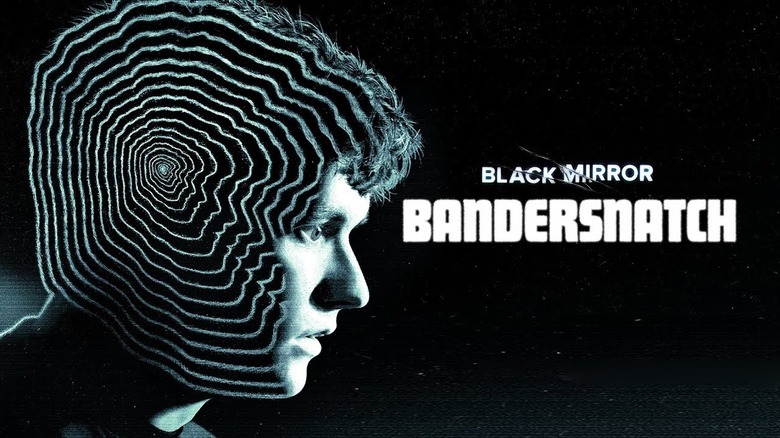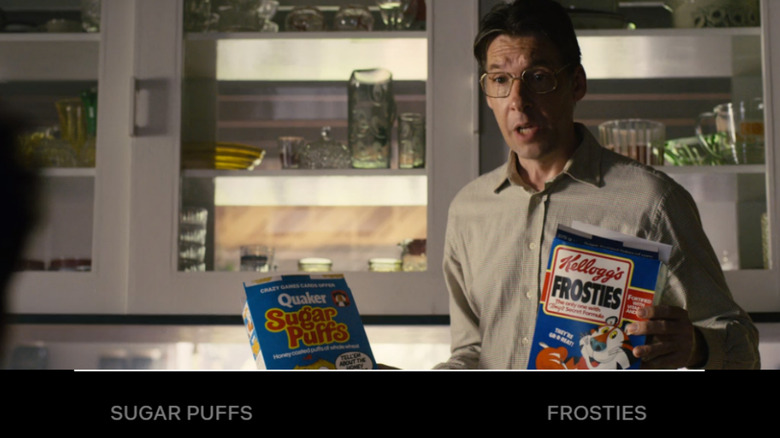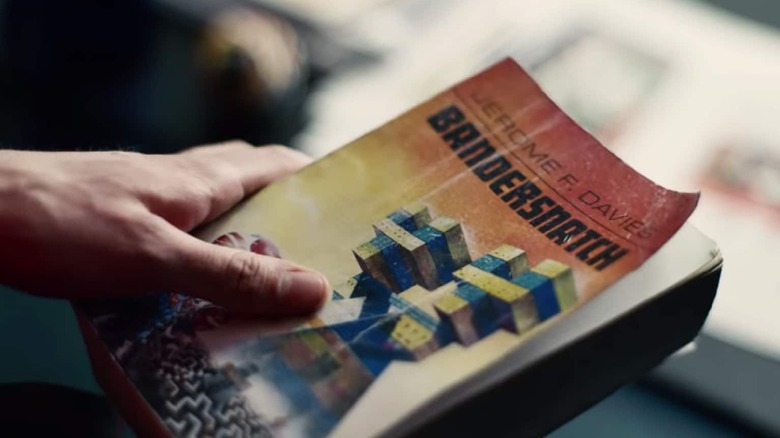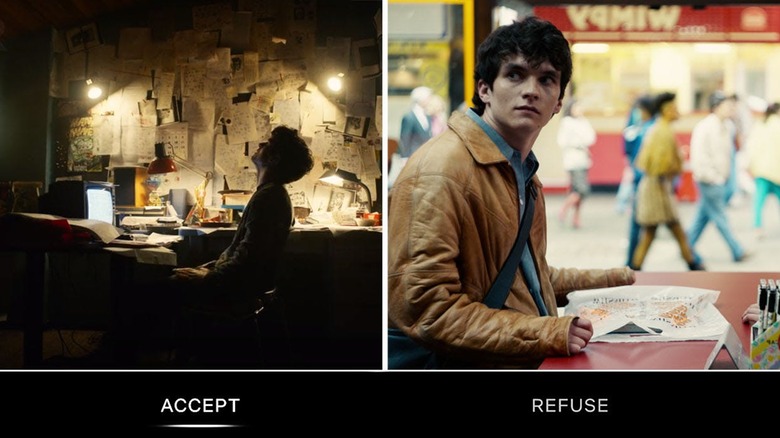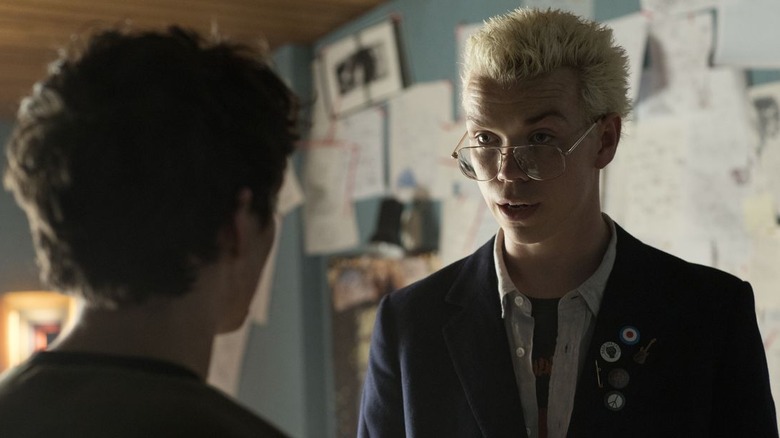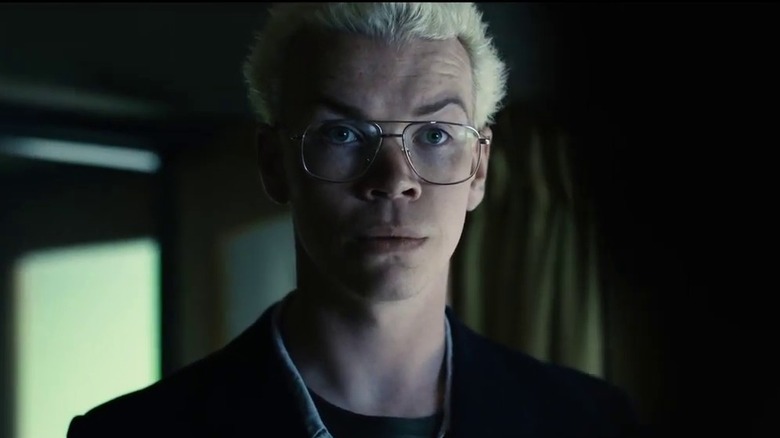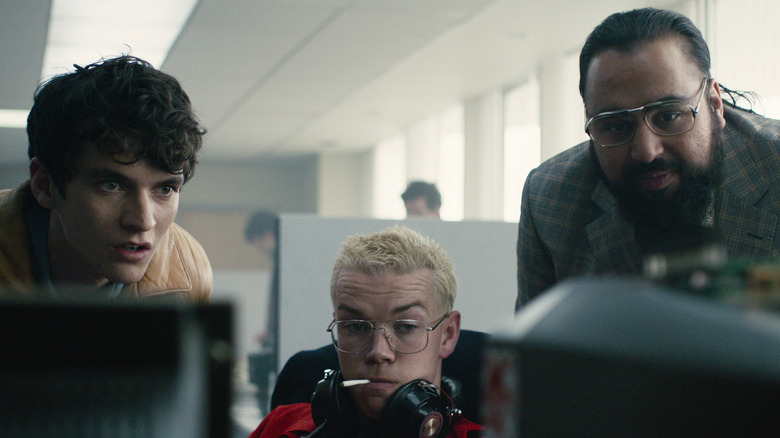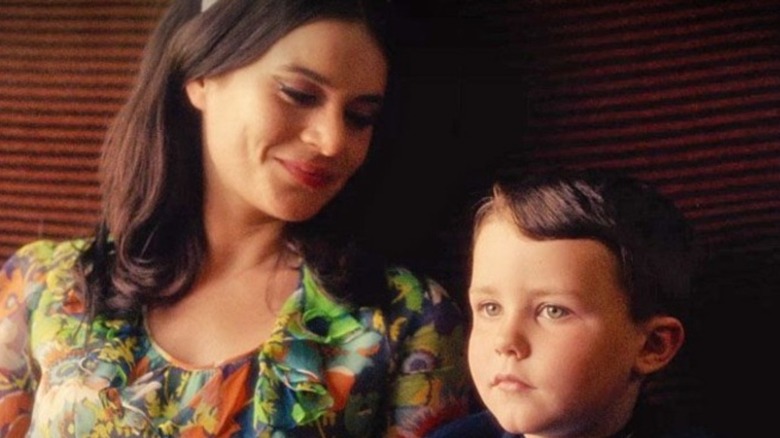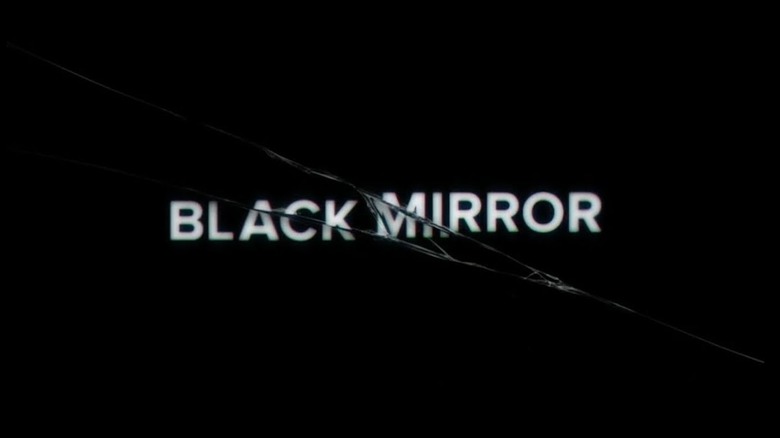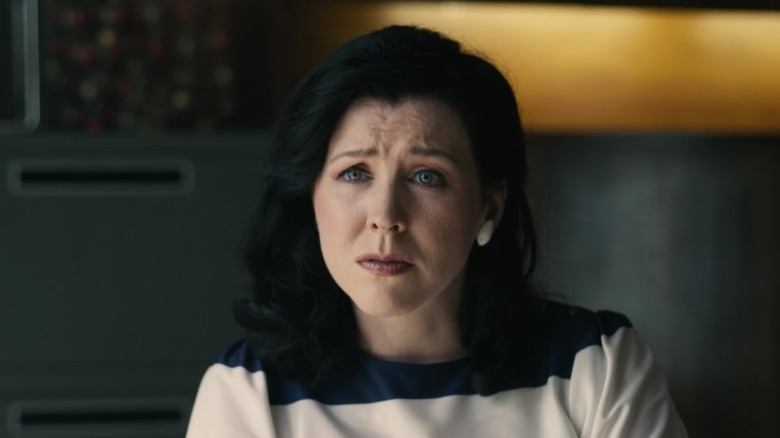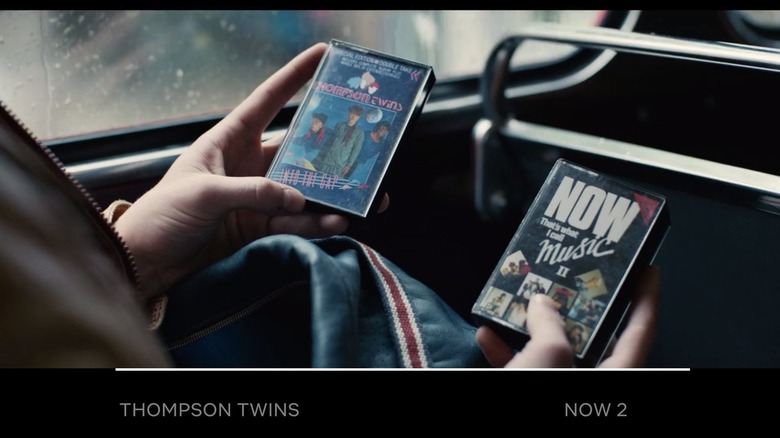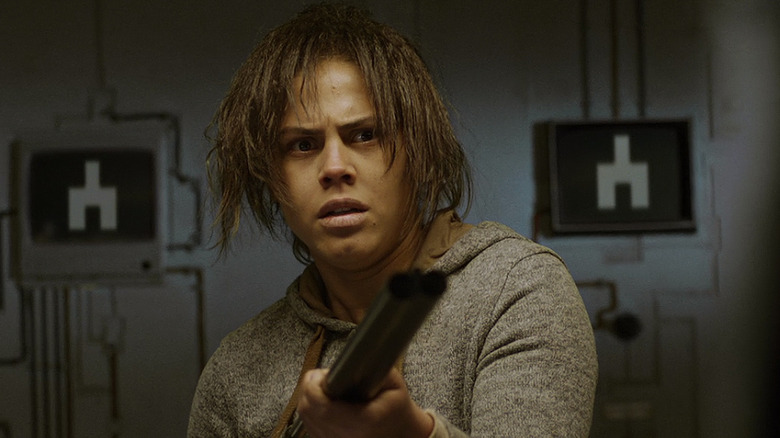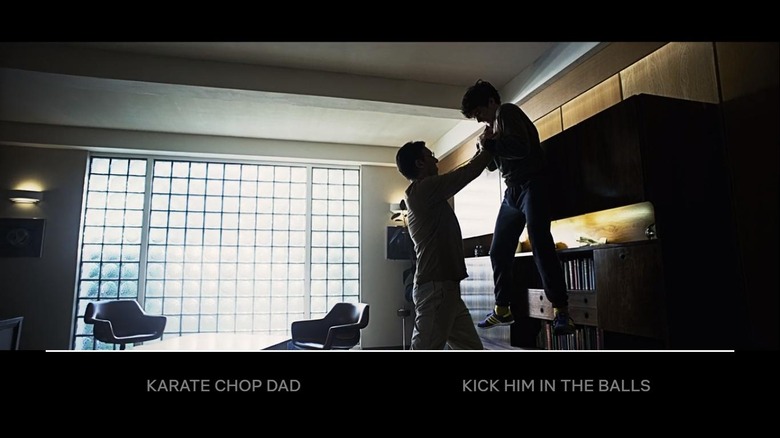The 6 Best And 6 Worst Things About Bandersnatch
Black Mirror: Bandersnatch is an impressive bit of work, creating a new advantage for Netflix in the battle of the streaming services. Not only does its unique "Choose Your Own Adventure" style straddle the line between film and video game, but it also opens new doors for the platform. The Verge writes that Netflix could use a format like Bandersnatch to gather data on a litany of user choices. And Black Mirror is already a hugely popular franchise for Netflix — anything billed under showrunner Charlie Brooker's banner generally means something well-made and thought-provoking is headed your way.
That said, not everything about Bandersnatch is perfect. Chooseco, the publisher that owns the "Choose Your Own Adventure" label, brought a lawsuit against Netflix for namedropping the title. The whole project has been a bit divisive — especially in the realm of Black Mirror episodes — with extremely wide ranging takes on its effectiveness. It's also not quite as groundbreaking as the hype might have you believe — kids' programming has already featured the technology in Bandersnatch.
With that in mind, we're taking a look at the best and worst of everything Bandersnatch has to offer. Spoilers abound, but luckily, you're in control ... or are you?
BEST: As a trial for something bigger, it totally works
Although the technology for Bandersnatch's interactivity had already been rolled out by Netflix, it was impressive to see it utilized in such a successful way with a property as big as Black Mirror. Enjoying Bandersnatch as a technical feat was quite easy, and anyone who has sat through a few episodes of Black Mirror could probably tell right away that the choices weren't going to remain as innocuous as what kind of cereal to eat or what music to listen to. It's especially impressive watching it on a game console, which allows the controller to shake a bit, giving warning that a difficult choice was on the way.
The tech-themed anthology is a perfect setting for Bandersnatch, making for an ideal marriage of concept and format. Even though Charlie Brooker has has said there won't be more interactive episodes of Black Mirror, it wouldn't be surprising to see more shows try their hand at generating the type of discussion that Bandersnatch did.
WORST: On its own, the story is a bit flimsy
Despite how well the project works in concept, Bandersnatch's story is unable to keep up with its lofty intentions. This is partially because the standard for Black Mirror has been set so high, and partially because of the nature of the "interactive story" medium.
In their review of the episode, Variety writes that "Bandersnatch, as creative work and not as experiment, falls so short of the standard Black Mirror has set that to put it forward is to risk the credibility the series' first four seasons have earned." Most Black Mirror episodes really have something to say about the pros and cons of a particular aspect of technology, but disguise it enough so viewers don't realize they are just watching a fable. Most of the negative reviews of Bandersnatch argue that it fails to do so.
This is partially due to something that anyone who has played a Telltale game can attest to. By giving viewers/players an illusion of choice, Bandersnatch was able to do something new and original. However, it needed to railroad certain elements to the story in order to make those "choices" fit with with what the episode was trying to say. In the format of Bandersnatch, creating a deep, truly impressive story while still giving a viewer options that matter would be extremely difficult and expensive.
BEST: You can correct your mistakes
Early on in Bandersnatch, there are a few decisions that can abruptly end the story. Similar to the "bad" paths in the books from which the episode draws its inspiration, these choices teach you a valuable lesson: don't do that!
Unlike the "Choose Your Own Adventure" novels of yesteryear, Bandersnatch doesn't demand that you start all the way back at the beginning if you choose one of the paths that ends the story prematurely. Instead, it allows you to rewind to the point where your path went wrong, choosing another option and continuing the story.
This encourages exploration — viewers aren't punished for deciding to fall down the rabbit hole and watch what happens. With stories like this, it is possible to get stressed out about choosing the "right" choice. Bandersnatch eases the viewer in a bit, letting them play for a while before the big choices start to crop up.
Netflix has also revealed that the rewind feature opens up new branches of the story by releasing cryptic messages like this on Twitter: "think you've seen everything there is to see in bandersnatch? try picking up the family photo, ~twice~"
WORST: You can't get it "wrong"
From another angle, however, this development decision can lessen the impact of Bandersnatch's story and keep it from that feeling of dread that some of the best Black Mirror episodes can evoke. Think about episodes like "The Entire History of You," "Shut Up and Dance," or "Crocodile." Early on, the main characters in those episodes set themselves down paths to destruction. "Crocodile" wouldn't be such a gut-punch if the viewer could just rewind and choose something like "Watch the road so you don't hit the guy."
Letting viewers correct their mistakes lowers the stakes of Bandersnatch. It might have made the experience less fun for the internet community if people had to start over every time the story ended, but it would have also helped to make the viewer think harder about the choices they make and have more of a sense of ownership over "their" version of the story.
BEST: There are some great performances throughout
Black Mirror has never had trouble attracting big name talent — Jon Hamm, Bryce Dallas Howard, Domnhall Gleeson, Daniel Kaluuya, Hayley Atwell, and Jodie Whittaker are just some of the stars that have appeared on the show. A-list or not, the talented performers are consistently game for whatever unnerving adventures each episode sends them on. Bandersnatch is no exception: Dunkirk's Fionn Whitehead stars as Stefan, and he's joined by several other fan favorites and up-and-comers, like Will Poulter as Colin and Alice Lowe as Dr. Haynes. These actors contribute to an extremely talented ensemble and help bring the world of Bandersnatch to life.
Poulter's performance as wiz kid programmer Colin Ritman stands out in particular. He brilliantly weaves exposition and personality, guiding Stefan (and the viewer) through his own unique concept of reality, which sets things up for the later twists and turns the story can take. Too bad he isn't from an alternate universe where people can survive long falls.
WORST: Some characters aren't as interactive as they could be
It's a shame that Bandersnatch doesn't allow you to influence other characters more to see how their stories play out. Obviously, the story follows Whitehead's Stefan, but the viewer's choices affect many other characters besides him. Depending on the paths chosen, for example, Dr. Haynes might become a violent kung-fu master. Stefan's dad, Peter, can be revealed as part of a vast conspiracy, remain a lamenting husband and father, or get turned into an effective fertilizer.
Other characters, however, don't get to contribute many alternating branches to the story. This is the frustrating case with Mohan Thakur (Asim Chaudhry), the brash Tuckersoft executive who gives Stefan his shot. He never gets to evolve much over the plot of Bandersnatch, a fate shared by several other supporting characters. It would obviously be impossible to plot out multiple paths for every single member of the cast, but it would have been nice to move outside the core group with some options.
BEST: Trying to game the system and find new endings is a blast
Netflix knows the Black Mirror audience well, and that's why Bandersnatch was seemingly designed with binge watching in mind. They had to know that people were immediately going to start combing through the episode, laying out what path each choice will take viewers down and comparing notes in order to see all the content the episode had to offer. The rabid fan base of Black Mirror ate it up and gave plenty of word-of-mouth marketing advantages to Bandersnatch.
By taking a chance and allowing some paths to lead to absurd outcomes, Brooker and the Black Mirror team made finding every secret and alternate choice into a sort of scavenger hunt. It wasn't long before guides to the various endings started popping up, giving hardcore fans an excuse to try to pry open every scene and find every little secret they could. Finding something your friends hadn't and telling them how to access it became a game in itself, leading even more viewers to rewatch Bandersnatch and try new things.
WORST: There might be *too* many detours
Black Mirror's showrunner, Charlie Brooker, is a bit prickly about his baby, and that prickliness has led to some confusion about a lot of elements within Bandersnatch. For example, The Hollywood Reporter writes that even the show's creative team can't agree on how many endings there are. Netflix claims there are five main endings, and each has slight variations depending on the choices the viewer makes. Ask the showrunners, and things change.
Producer Russell McLean says there are ten or twelve. Episode director David Slade says that number is correct, but there are also "Golden Eggs" hidden throughout that are extremely difficult to find. He even told THR, "There are scenes that some people just will never see and we had to make sure that we were okay with that. We actually shot a scene that we can't access."
It gets even weirder. Brooker's producing partner, Annabel Jones, agrees with the Netflix estimate of five true endings. However, Brooker himself does not. All this obfuscation (which is probably deliberate) makes it practically impossible to know all the secrets that Bandersnatch contains. And with so many seemingly insignificant choices that could possibly impact later events, it would take an absurd amount of time and energy to find everything it has to offer.
BEST: It lets you have fun
There are some extremely bleak episodes of Black Mirror out there. Stories like "Crocodile," "Metalhead," and "White Christmas" don't offer a lot of hope that humanity will harmonize with technology and become better for it. However, some of the most well-received episodes, like "San Junipero" or "Hang the DJ," offer elements of hope and fun amidst all the doom and gloom. Even horribly frightening episodes like "USS Callister" or "Be Right Back" remember to inject some comic relief.
The element of fun left fingerprints all over Bandersnatch. Even as things spiral out of control for Stefan, Bandersnatch never forgets that it was also a game. The early choices about cereal and music are lighthearted and bring out a bit of ironic humor. Even heavier choices (should I yell at Dad or should I kill him?) are often presented with a bit of a knowing wink to the audience. Bandersnatch remembers that entertainment is supposed to be entertaining, and it benefits from that.
WORST: Some of its self-aware humor is a bit too cute
Meta humor can be a slippery slope. Letting the audience know that the film or game "gets it" is a great way to add cerebral humor and encourage repeat viewings, but it can quickly fall into the "too cute for its own good" realm. And a few of the options given to the viewer throughout the course of Bandersnatch fall on that side of things.
Being able to tell Stefan that "Netflix" was the organization watching him was one such choice. Since the episode was set in the 1980s, watching a show that is a Netflix original try to explain Netflix to its central character was a bit jarring.
Some of the jokes in Bandersnatch worked quite well — having the option to choose "Yes" or "F**k yeah!" when your therapist suggests that your life would be more exciting if it were being televised stood out as a solid choice. Not every joke will work for every viewer, though, which is likely why they sprinkled a few different styles of humor throughout.
BEST: Connections to the Black Mirror universe
One of the biggest aspects driving Black Mirror's popularity is the uncertainty about whether or not its stories take place in a shared universe. Bandersnatch brought in a massive amount of Easter Eggs, linking it to several other episodes and helping to further the theory that, eventually, every episode could be tied together and lead to some coherent, massive story.
Colin's games (Metl Hedd and Nohzdyve) are both named after episodes from previous seasons. There are newspaper headlines in some paths that link Bandersnatch to previous stories as well. Even Tuckersoft itself, the company that Stefan works with to develop his game, could be an early incarnation of TCKR, the company behind a lot of the dystopian tech central to the world of Black Mirror.
Even more obvious were the references to the episode "White Bear." The central icon of Bandersnatch — the bifurcated "decision tree" symbol — is the same symbol used at White Bear Memorial Park in the episode. Fan theories surrounding a Black Mirror shared universe are all over the place, despite the fact that the showrunner argues that it's a "shared Black Mirror multiverse ... in which we can do whatever the bloody hell we feel like."
WORST: It can't "mean" that much for Black Mirror
This brings us back full circle to the central problem of Bandersnatch: in trying to accomodate for all the possible choices and in order to let fans experience the episode how each wanted, it can't really mean that much to the series as a whole. Charlie Brooker doesn't seem like the type to tie the experience down to one particular meaning.
Since a canonical ending seems unlikely to come about, Bandersnatch cannot, ultimately, have too many implications on the fan-imagined Black Mirror universe as a whole. Some fans may have never seen a specific path, while others will have seen everything the episode offers — either way, there's no obvious or satisfying way for the show to say, "This is the correct ending, and everyone else did it wrong." It would be counter-intuitive to the nature of the show, particularly this specific episode.
Unless, maybe, there's something hidden within Bandersnatch itself that indicates how everything should play out. You should probably chop up your dad again, just to make sure it won't show something new this time.

